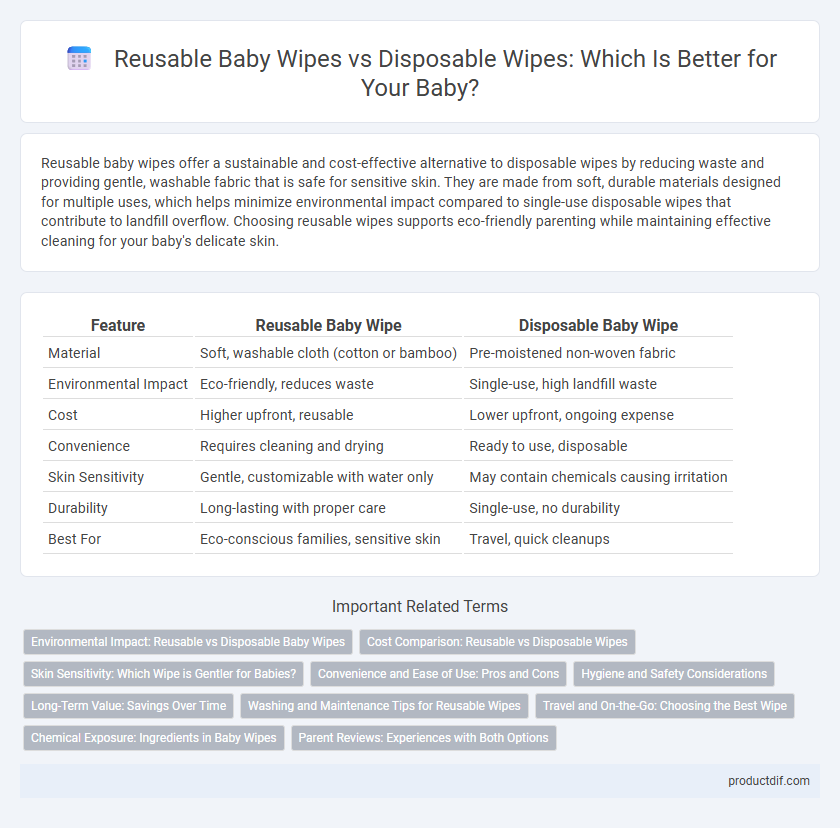Reusable baby wipes offer a sustainable and cost-effective alternative to disposable wipes by reducing waste and providing gentle, washable fabric that is safe for sensitive skin. They are made from soft, durable materials designed for multiple uses, which helps minimize environmental impact compared to single-use disposable wipes that contribute to landfill overflow. Choosing reusable wipes supports eco-friendly parenting while maintaining effective cleaning for your baby's delicate skin.
Table of Comparison
| Feature | Reusable Baby Wipe | Disposable Baby Wipe |
|---|---|---|
| Material | Soft, washable cloth (cotton or bamboo) | Pre-moistened non-woven fabric |
| Environmental Impact | Eco-friendly, reduces waste | Single-use, high landfill waste |
| Cost | Higher upfront, reusable | Lower upfront, ongoing expense |
| Convenience | Requires cleaning and drying | Ready to use, disposable |
| Skin Sensitivity | Gentle, customizable with water only | May contain chemicals causing irritation |
| Durability | Long-lasting with proper care | Single-use, no durability |
| Best For | Eco-conscious families, sensitive skin | Travel, quick cleanups |
Environmental Impact: Reusable vs Disposable Baby Wipes
Reusable baby wipes significantly reduce environmental impact by minimizing waste generation, as they can be washed and used multiple times, unlike disposable wipes that contribute to landfill overflow and plastic pollution. Disposable wipes often contain synthetic fibers and chemical additives, which decompose slowly and release toxins, whereas reusable wipes typically use natural, biodegradable materials, promoting sustainability. Choosing reusable baby wipes supports eco-friendly parenting by lowering carbon footprint and conserving resources over time.
Cost Comparison: Reusable vs Disposable Wipes
Reusable baby wipes have a higher upfront cost due to purchasing durable cloth materials, but they significantly reduce long-term expenses by eliminating the need for frequent repurchases. Disposable wipes cost an average of $0.02 to $0.03 per wipe, leading to cumulative expenses often exceeding $100 annually for regular use. Families seeking cost efficiency benefit from choosing reusable wipes, which are washable and environmentally sustainable, resulting in substantial savings over time.
Skin Sensitivity: Which Wipe is Gentler for Babies?
Reusable baby wipes are often gentler on sensitive skin due to their natural, breathable materials such as cotton or bamboo, which reduce the risk of irritation and allergic reactions. Disposable wipes frequently contain chemicals, fragrances, and preservatives that can cause redness and discomfort, especially for babies with eczema or sensitive skin. Choosing hypoallergenic, chemical-free reusable wipes supports healthier skin by minimizing exposure to harsh substances and promoting better moisture balance.
Convenience and Ease of Use: Pros and Cons
Reusable baby wipes offer eco-friendly convenience by reducing waste and often feature soft, durable materials that can be easily cleaned, but they require laundering after each use, which can be time-consuming. Disposable wipes provide unmatched ease of use with single-use convenience and portability, making them ideal for quick cleanups and travel, though they generate significant environmental waste. Choosing between reusable and disposable wipes depends on balancing immediate convenience against sustainability and long-term cost efficiency.
Hygiene and Safety Considerations
Reusable baby wipes offer a sustainable alternative to disposable wipes, but require thorough cleaning and sterilization after each use to prevent bacterial growth and skin irritation. Disposable wipes are pre-moistened with antibacterial solutions, providing a convenient and hygienic option for single use, reducing the risk of cross-contamination. Parents must balance environmental impact with the necessity for optimal hygiene and safety to protect sensitive baby skin.
Long-Term Value: Savings Over Time
Reusable baby wipes offer significant long-term savings by eliminating the constant need to repurchase disposable wipes, which can cost families hundreds of dollars annually. High-quality cloth wipes can be washed and reused hundreds of times, reducing waste and environmental impact while providing a cost-effective solution. Investing in durable, washable wipes not only supports budget-friendly parenting but also promotes sustainable baby care practices.
Washing and Maintenance Tips for Reusable Wipes
Reusable baby wipes require gentle washing with mild, fragrance-free detergent to maintain softness and prevent skin irritation. It is essential to rinse thoroughly and air dry or tumble dry on low heat to preserve fabric integrity and prevent bacterial buildup. Regularly soaking wipes in a mixture of water and a small amount of baby-safe disinfectant helps keep them hygienic and safe for sensitive baby skin.
Travel and On-the-Go: Choosing the Best Wipe
Reusable baby wipes offer eco-friendly convenience for travel, as they can be washed and used multiple times, reducing waste and packing needs. Disposable wipes provide ultimate convenience on-the-go, perfect for quick cleanups without the hassle of carrying wet cloths or cleaning supplies. Parents often prefer disposables for short trips due to portability, while reusable wipes suit longer journeys with access to laundry facilities.
Chemical Exposure: Ingredients in Baby Wipes
Reusable baby wipes significantly reduce infants' chemical exposure compared to disposable wipes, which often contain preservatives, fragrances, and alcohol that may irritate sensitive skin. Ingredients such as parabens, phenoxyethanol, and synthetic dyes in disposable wipes pose potential risks of allergic reactions or hormone disruption. Choosing reusable wipes made from natural fibers helps minimize contact with harmful substances while promoting safer skincare for babies.
Parent Reviews: Experiences with Both Options
Parents often highlight the eco-friendly benefits and cost savings of reusable baby wipes, praising their softness and durability after multiple washes. In contrast, disposable wipes receive mixed reviews for convenience and hygiene but are criticized for environmental impact and potential skin irritation. Many parents prefer using reusable wipes at home while reserving disposable ones for outings due to ease of use and portability.
Reusable baby wipe vs disposable wipe Infographic

 productdif.com
productdif.com